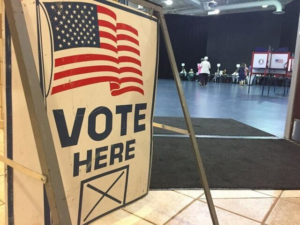Growing up outside of Washington, DC, politics is life. But, as a 15 year old, volunteering isn’t the same as voting. It was the second half of the 1990s and no one had heard of the term “social media”. But we had just discovered the World Wide Web, Geocities had just provided a platform to create a free website and online services like Prodigy and AOL, and newsgroups had created the opportunity for community-building before one was old enough to get their driver’s license.
 A few years before, I had been active in a vegetarian youth community that ended up being a front page story in Newsweek. I figured I could do the same about political disenfranchisement. I had started to read articles and discussions about extending civil rights for young people, but it was still nascent. I decided that I was going to use this new platform to try to raise awareness for the cause dear to me – voting.
A few years before, I had been active in a vegetarian youth community that ended up being a front page story in Newsweek. I figured I could do the same about political disenfranchisement. I had started to read articles and discussions about extending civil rights for young people, but it was still nascent. I decided that I was going to use this new platform to try to raise awareness for the cause dear to me – voting.
I started a mailing list and a website – YouthSpeak – to call for lowering the voting age to 15, pragmatic and possible, first on the state level. It wasn’t much at first, but the community grew and later we launched the first nationwide protests in several states calling to lower the voting age.
At the same time, there were others. Peacefire was founded to fight Internet censorship – disproportionately affecting young people – this was the age of the Communications Decency Act, the first attempt to regulate online porn, and the first generation of the Web. Canada had the Canadian Youth Rights Association and the US had ASFAR. Americans for a Society free from Age Restrictions, founded by Matt Walcoff and Matt Herman, two University of Maryland students, was intended to cover a broader youth rights agenda, intended to be a pragmatic youth rights umbrella. Unfortunately, however, with an extensive “declaration of principles” and a poorly-conceived name, it quickly got overtaken by a small but vocal minority that wanted to take things to the extreme, and looked to radicalize the agenda.
This was something that was unacceptable and so an attempt was made to rename ASFAR to promote a more moderate, politically pragmatic agenda. I joined up with Walcoff and Herman, meeting at UMD, and we looked to create a more structured and pragmatic framework. When it was clear we couldn’t get support to rename ASFAR, the National Youth Rights Association was formed. We also incorporated (ironically with only those members above 18 eligible to sign) so we could accept donations and speak in a legal capacity.
We got articles in Slate, the Washington Post, and began pushing a pragmatic political agenda to advance youth rights, where 18 or 21 didn’t automatically begin one’s civil rights.
How has your involvement in NYRA shaped who you are today, or helped you achieve some success or growth in your life?
I learned two important things from NYRA: the importance of creating a proper, pragmatic foundation – which is the key for real results and laid the foundation for NYRA’s continued operations – and the importance of vision – the commitment of the dedicated few to continue the initial vision and goal, even when times are tough or the “cause” is less personally relevant as one ages.
How has your understanding or support for youth rights evolved over time? You are older now than when you first got involved, do you still support youth rights?
I think I was too mature for my age, when we tried to create a pragmatic foundation to support civil rights for those under 18. But as more than two decades have passed since I first founded YouthSpeak, I think the original vision was right on target. Allowing 17 and 18 year old soldiers to drink, 16 year olds to vote in elections, and high school students to open bank accounts was absolutely right.
Looking back, I think my mistake was focusing on the petty bickering of a few immature people rather than understanding how to create political alliances and manage campaigns and that is something that held us back in the beginning. Today, I work in international high tech, and I see that both startups and corporate entities live or die from the combination of vision and pragmatism. That’s the same with NYRA.
What were some interesting/fun stories/anecdotes of your past with NYRA?
It was hard to create virtual relationships, in the age of expensive long distance, poor VOIP and the wallet of a 15 year old. But I think one anecdote was just a trip to Staples on the day of the nationwide voting age protests, because I had to fax – yes, fax – the media our press announcements showed just how different things were.
What are some key achievements that NYRA had during your time, or what are some things you’re especially proud of that you worked on with NYRA?
I’m proud we created the foundation for long-term success. After 20 years, avoiding these ideological infights and attracting extremists that took down ASFAR have kept NYRA strong. We had the US’s first protests for a lowered voting age. This was not a topic that was initially discussed but later, thanks to NYRA, it became the subject of an episode of the West Wing!
What personal relationships did you make during your involvement with NYRA?
I had made many relations, from Bennett Haselton at Peacefire, Matt Walcoff and Matt Herman from NYRA, Alex, who joined us later at NYRA while in college, Joshua Gilbert from CYRA and more. Sadly, Matt and Josh passed away way too young.
Since you first got involved, do you feel the wider cause of youth rights has advanced? How has the broader landscape for youth rights changed in that time?
When we started, youth rights was in its infancy. I’m incredibly pleased at the progress, even if most countries still have an 18 year old national voting age. The topic was a primetime TV episode in the West Wing! I could never have imagined that.
Today, only the US has a 21 year old drinking age, several cities in Germany, Canada, and several municipalities and states in US have all had referendums for a lower age. Austria’s voting age is 16 and Takoma Park, MD’s voting age for local elections is 16.
Change is hard and it takes an extremely long time but I don’t think this would have happened if we hadn’t founded NYRA.
What advice or tips do you have for young people getting involved in NYRA now? Do you have any wisdom to impart?
I think there are three important things: stay pragmatic and policy oriented, create political alliances, but don’t ever let go of the vision.
I also think it’s important, for a group made up of young people, to understand that knowledge and experience – not age – do build experience. I know more from mistakes I made in the past, whether 2 years ago or 20 years ago – and now have the luxury of time. So I think also it’s helpful to interact with different age groups and experiences to learn more about how to be effective.
What does NYRA mean to you?
Pride.
Any hopes or well wishes you have for NYRA going forward.
I wish NYRA the best of luck and success and I’m pleased to see “my baby” celebrate twenty years. I look forward to it’s growth and more policy victories. May it go from strength to strength.
Avi Hein
Founder, President, Board member 1998-2000, 2002-2003







